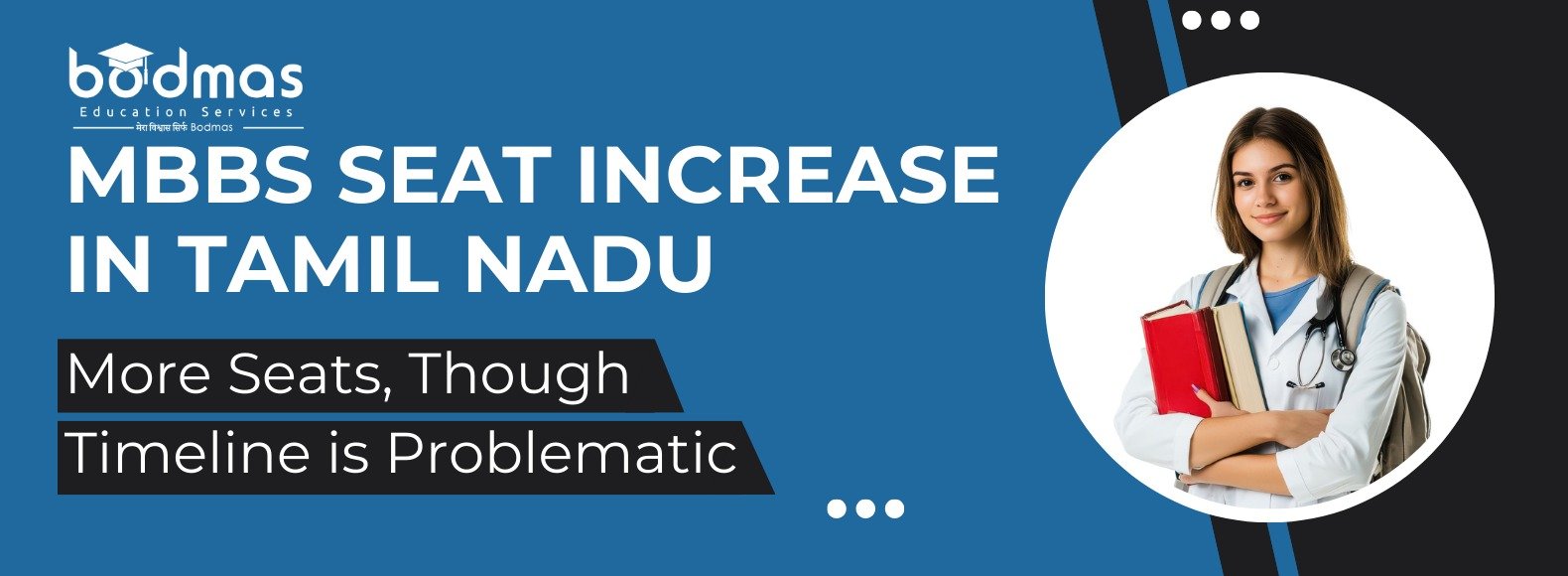MBBS Seat Increase in Tamil Nadu: More Seats, Though Timeline is Problematic
The strain on the Indian medical admissions system does not come as a revelation to anyone who has worked in the medical or education sector over the last couple of decades. The medical education powerhouse of Tamil Nadu is shaping the future by proposing to increase the number of MBBS seats by up to 1,750 by the 2025-26 academic year. This growth is pointed out, the admission process is delayed whereas students, parents and educators are left hanging. Here is a summary of what is going on, why it is important, and the implications for future doctors.
A Big Boost in MBBS Seats
Tamil Nadu will be able to increase its medical education capacity considerably. More than twelve independent-funded medical colleges are likely to obtain an additional 50 to 150 MBBS seats each in the second round of counselling during the 2025 academic year. Four identified universities will most probably add 400 new undergraduate medical seats each, which will increase to 1,750 new undergraduate medical seats. It is a big step towards a state that is already proud of 77 medical colleges and 12,050 MBBS seats, according to recent data.
Such growth would be a game-changer for students who aspire to pursue a medical career. Increased seats translate to increased opportunities, particularly in a state where the competition to secure government college positions is intense, thanks to relatively lower charges (approximately 4.22 lakh in five years, versus as high as 1.25 crore in private colleges in other states, say Haryana). To struggling students, this may provide access to a career that otherwise would be inaccessible.
Why the Delays?
This is the place where it becomes tricky. National Medical Commission (NMC), the body that regulates medical education in India, is accepting applications to new seats not only in Tamil Nadu but also across the board. This has slowed down admissions, where the Medical Counselling Committee (MCC) has been ordered to stop until the reviews have been made. On August 23, 2025, the MCC declared that Round 2 of undergraduate counselling which was initially scheduled to commence on August 29 would be postponed to add these additional seats. But a new schedule has not been published yet, and everybody is waiting.
The Central committee that controls 15 percent of the government college seats, all the central institution seats and the deemed university seats have also moved the new date of freshmen, which was initially set at September 5. Colleges are not yet likely to open after September 20, and all four rounds of counselling will probably be another month. This is frustrating, particularly to the educators who view the ripple effects on the school calendar.
The Impact on Students and Colleges
A person with years of experience in the field of education understands the implications of late admissions. One of the professors of a government medical college indicated that the late beginning schedule compels colleges to squeeze the courses and reduce study breaks and holidays in a bid to finish the huge MBBS syllabus. This is added to freshmen who are already going through a challenging curriculum. There is further complexity in the fixed year end exams. In case the postponements make the exam late, the student may not find postgraduate admission, thus affecting their career path.
The increasing number of seats is especially frustrating to academicians as, though the increase is exciting, it is the uncertainty surrounding admissions that is causing havoc. The state counselling that serves 85 percent of government colleges and all the privately owned college seats in Tamil Nadu relies on the schedule of the Central committee. In the absence of an explicit timeline, state officials are unable to proceed and place students and parents in a holding pattern.
Why This Matters
The move by Tamil Nadu to increase the number of MBBS seats by 1,750 may be seen as indicating its desire to increase medical education which has become very important in a country where population is on the rise and the healthcare needs are on the rise. There are 1.7 lakh MBBS seats across the country and more than 23 lakh students who appeared to take NEET in 2024 and each of these new seats matters. However, the delays show that increasing capacity is not the solution when the system cannot provide admissions on time.
In the case of more seasoned professionals, this scenario highlights the importance of enhanced collaboration between regulatory organisations such as the NMC and counselling committees. It also brings to the fore the question of quantity versus quality-assurances of new seats are accompanied by sufficient faculty and facilities. The 77 medical colleges already put Tamil Nadu at the forefront of others, but the way to cope with this growth is the real challenge.
What happens next to aspiring doctors?
Patience is one of the major aspects of students aspiring to attend medical colleges in Tamil Nadu. They would want to be ahead by preparing documents such as NEET scorecards and certificates now. The additional seats are a golden chance, and the delayed procedure will have to be manoeuvred through by keeping up with information and adapting.
This growth is a move in the right direction of making medical education more accessible, but the setbacks are a reminder that growth is accompanied by growing pains. To the aspiring doctors of Tamil Nadu, the time spent waiting may be painful, yet the prospect of studying in one of the leading medical education centres in India may be worth it.
📞 Contact us today and take the first step toward your dream career! 🚀Have Questions? Ask Us!
_1743598199.jpeg)
We're Here for You
Powered by Froala Editor







